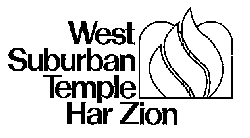

The origin of our congregation dates back to the 1920s when Conservative Jews gathered for High Holiday services at a hall in Forest Park and in the former Oak Park Armory. In 1934-35 this group received a charter from the State to form a not-for-profit religious organization, "The West Suburban Jewish Community Center" A rented store on Madison Street just east of Harlem Avenue in Oak Park served as the locus for Friday night religious services, Hebrew and Sunday School. A University of Chicago student, Roy Brenner, was retained to teach the children and lead the services.
Growth of the congregation during the 1930s led to the purchase and remodeling of a building at 414 Lake Street in Oak Park to serve as the first permanent synagogue. At that time the congregation assumed the name "West Suburban Jewish Center" Rabbi Israel H. Weisfeld became the spiritual leader of the congregation and organized a four-day per week religious school. The Lake Street building was too small to meet the needs of this busy, growing congregation, so plans were made to enlarge the structure. However, a new village ordinance required frontage consents from 51% of the property owners within a radius of four hundred feet from the site, which the congregation was unable to obtain. The apparent reluctance of their Oak Park neighbors to permit increased growth of the Temple, coupled with a world climate of pervasive and blatant anti-Semitism, caused the congregation's leaders to refrain from taking the Village to court. Wartime constraints on construction materials and labor forestalled further talk of construction until the end of World War II.
The 1940s saw dramatic growth of the west suburban Jewish population as Jewish families made their way from city neighborhoods to the western suburbs. By 1950 two hundred eighty families had joined the congregation. The proposed expansion site would not meet the needs of the rapidly growing congregation. Consequently, the congregation pursued alternative sites, eventually locating its current site in River Forest. This location was zoned for schools and houses of worship, and was free of restrictive covenants.
However, anti-Semitism again became an obstacle to frontage consents. Successful lobbying of the village trustees resulted in revocation of the ordinance on the eve of Yom Kippur in 1949. The congregation received the building permit in December, 1949 and the cornerstone of our current temple was laid on May 28, 1950.
 Construction of the Sanctuary and north wing was completed on June 3, 1951. The entire structure was completed with the addition of Gottlieb Community Hall, the kitchen, and classrooms in October, 1953.
Construction of the Sanctuary and north wing was completed on June 3, 1951. The entire structure was completed with the addition of Gottlieb Community Hall, the kitchen, and classrooms in October, 1953.
The name of the congregation was changed; first to "West Suburban Temple," and later to "West Suburban Temple Har Zion." Rabbi Moshe Babin led the congregation during this period of growth and expansion. In 1951, the twenty-nine year old Cantor Harold Brindell was engaged by the congregation.
The following two decades were a period of great cultural liveliness for the congregation with regular staging of plays and musicals, many social events, and a prominent juried art exhibition; the Sisterhood-sponsored "Winter Show. " Joseph Tabachnik arrived with his young family to lead the congregation in 1964. Under his guidance social, educational, and religious programs were developed to meet the needs of the many young families in the congregation.
On November 5, 1967 the stained glass windows in the Gottlieb Community Hall were dedicated. These unique windows were designed by the prominent artist, William Gropper. Funding for their creation and installation was provided the congregation.One of the outstanding events in the life of the synagogue during the 1970s was the dedication of a new Torah scroll in June, 1976. The congregation commissioned the scroll as a major fundraising event. Many dozens of people participated in the completion of the writing of the Torah, fulfilling this mitzvah with their fellow congregants.
In 1976 the synagogue began producing plays and musicals with the assistance of many members. "Fiddler on the Roof" and "Joseph and the Amazing Technicolor Dreamcoat" were among the productions presented during the 1970s and 80s
The 1980s were distinguished by the growth of the congregation to its current membership of approximately four hundred families. In 1984 a redesign and enhancement of the Ark was undertaken; creating a more dramatic and prominent home for our Sifrei Torah. The increased architectural emphasis upon the Ark reflected the increased emphasis upon Saturday morning Torah services in the Conservative movement. The 80s also saw the development of an annual membership retreat, the "Kallah", as a source of communal development and spiritual growth.
With the retirement of Rabbi Tabachnik after twenty-six years, Rabbi Victor A. Mirelman assumed the leadership of the congregation in January, 1990. Under his guidance the pre-school programs have expanded and the religious school moved from Saturday to Sunday classes. With strong parent support we now have regular Children's Services on Shabbat.
In 1994 Rabbi Mirelman and West Suburban Temple Har Zion hosted an historic convocation of Lutheran and Jewish leaders at which the Evangelical Lutheran Church in America repudiated the anti-Semitic teachings of Martin Luther and the role of these teachings in promoting the Holocaust.
In January, 1994, the congregation launched the KADIMA Campaign, an ambitious fundraising program for the repair and renovation of this architecturally significant synagogue. The $1.4 million renovation, has ensured the vitality of our Jewish home for many decades to come.
In May, 1997, our much beloved Cantor Harold Brindell died. His forty-six years of service to the congregation made him a fixture in the hearts of two generations and a leader in the American Conservative cantorate. On June 1, 1998, Cantor Stewart Figa assumed the cantor's pulpit.
West Suburban Temple Har Zion, 1040 N. Harlem, River Forest IL 60305 Voice:(708)366-9000 Fax: (708)366-9006, E-mail: hgross_wsthz @sbcglobal.net
5/16/98 6:14:04 PM